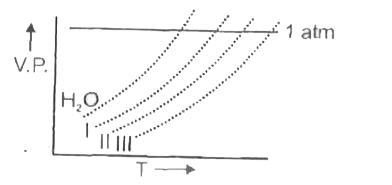Assertion (A): The elevation in boiling point for two isotonic solutions may not be same.
Reason (R ): The boiling point depends upon the concentration of the solute.
If both (A) and (R) are correct, and (R) is the correct explanation of (A).
If both (A) and (R) are correct, but (R) is not the correct explanation of (A).
If (A) is correct, but (R) is incorrect.
If both (A) and (R) are incorrect.
To solve the question regarding the assertion and reason about the elevation in boiling point for isotonic solutions, we will analyze both statements step by step.
Step 1: Understanding the Assertion
Assertion (A): The elevation in boiling point for two isotonic solutions may not be the same.
- Isotonic Solutions: Isotonic solutions are those that have the same osmotic pressure. This implies that they have the same concentration of solute particles.
- Elevation in Boiling Point: The elevation in boiling point is a colligative property, which means it depends on the number of solute particles in a solution, not their identity.
Step 2: Evaluating the Assertion
Since isotonic solutions have the same concentration of solute particles, the elevation in boiling point for both solutions must be the same. Therefore, the assertion that the elevation in boiling point for two isotonic solutions may not be the same is incorrect.
Step 3: Understanding the Reason
Reason (R): The boiling point depends upon the concentration of the solute.
- The boiling point elevation is indeed related to the concentration of the solute. However, it is important to note that the elevation in boiling point is a function of the number of solute particles and the nature of the solvent.
Step 4: Evaluating the Reason
The reason states that the boiling point depends on the concentration of the solute. While this is partially true, the boiling point elevation is primarily a colligative property that depends on the nature of the solvent and the total concentration of solute particles. Therefore, the reason is also incorrect as it does not fully capture the relationship.
Conclusion
Both the assertion and the reason are incorrect.
Final Answer
- Assertion (A): Incorrect
- Reason (R): Incorrect
Thus, the correct conclusion is that both the assertion and the reason are incorrect.
---
Assertion (A): The elevation in boiling point for two isotonic solutions may not be the same.
- Elevation in Boiling Point: The elevation in boiling point is a colligative property, which means it depends on the number of solute particles in a solution, not their identity.
Since isotonic solutions have the same concentration of solute particles, the elevation in boiling point for both solutions must be the same. Therefore, the assertion that the elevation in boiling point for two isotonic solutions may not be the same is incorrect.
Reason (R): The boiling point depends upon the concentration of the solute.
The reason states that the boiling point depends on the concentration of the solute. While this is partially true, the boiling point elevation is primarily a colligative property that depends on the nature of the solvent and the total concentration of solute particles. Therefore, the reason is also incorrect as it does not fully capture the relationship.
Both the assertion and the reason are incorrect.
- Assertion (A): Incorrect
- Reason (R): Incorrect
Topper's Solved these Questions
- SOLUTIONSBook:CENGAGE CHEMISTRY ENGLISHChapter:SOLUTIONSExercise:Exercise (Interger)
Explore 8 Videos
- SOLUTIONSBook:CENGAGE CHEMISTRY ENGLISHChapter:SOLUTIONSExercise:Exercise(Fill In The Blanks)
Explore 19 Videos
- SOLUTIONSBook:CENGAGE CHEMISTRY ENGLISHChapter:SOLUTIONSExercise:Exercises (Single Correct)
Explore 99 Videos
- SOLID STATEBook:CENGAGE CHEMISTRY ENGLISHChapter:SOLID STATEExercise:Ex 1.2 (Objective)
Explore 9 Videos
- SURFACE CHEMISTRYBook:CENGAGE CHEMISTRY ENGLISHChapter:SURFACE CHEMISTRYExercise:Archives Subjective
Explore 2 Videos
Similar Questions
Knowledge Check
Assertion: Elevation in boiling point is a colligative property.
Reason: Elevation in boiling point is directly proportional to molarity.AIf both assertion and reason are true and reason is the correct explanation of assertion.BIf both assertion and reason are true, but reason is not the correct explanation of assertion.CIf assertion is true, but reason is false.DIf both assertion and reason are false

Which is having highest elevation in boiling point?
View SolutionDefine elevation in boiling point and show that it is a colligative property.
View SolutionAssertion (A): The molecular mass of polymers cannot be calculated using the boiling point or freezing point method.
Reason (R ): The boiling point method for determining the molecular masses is used for compounds stable at high temperature.
View SolutionAssertion (A): The molecular mass of polymers cannot be calculated using the boiling point or freezing point method.
Reason (R ): The boiling point method for determining the molecular masses is used for compounds stable at high temperature.
View SolutionAssertion (A): Larger the value of cryoscopic constant of the solvent, lesser will be the freezing point of the solution.
Reason (R ): Depression in the freezing point depends on the nature of the solvent.
View SolutionWhich solution will show maximum elevation in boiling point?
View SolutionAssertion (A): pH of neutral solution is always 7.
Reason (R) : pH of solution does not depend upon temperature.
View Solution